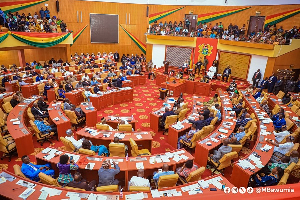The Ghana School Feeding Programme (GSFP) in collaboration with its key Development Partners has a two-day intensive Home Grown School Feeding National Learning Event in Accra.
The partners include World Food Programme (WFP), SNV Netherlands Development Organisation (SNV), Partnership for Child Development (PCD) and Alliance for a Green Revolution in Africa (AGRA).
The event was on the theme: “Sustaining the Ghana School Feeding Programme: Opportunities, Challenges and Lessons.”
Participants at the end of the event issued a communiqué, which reaffirmed the third objective of the Programme as a strategy to promote an increase in domestic food production and consumption; increase the incomes of poor rural households; and improve the health and nutritional status of the pupils in such deprived schools.
It said the GSFP has had a positive impact on enrolment, starting with a pilot in 10 beneficiary schools in 2005.
Statistics in March 2012 indicated that the average number of pupil enrolment in GSFP schools increased by 18 per cent from 2005 to 2011, and now covers all the 216 districts within the 10 regions of the country.
Tremendous strides have been made in improving attendance and reducing dropout rates. GSFP schools’ dropout rate was at an all-time low of 1.4 per cent.
It said during the 2013/2014 academic year the total enrolment of beneficiary pupils increased by 320.6 per cent from the 2006/2007 level of 413,498 to 1,739,352 in 4,887 public primary schools. This figure represents 39.43 per cent of the total national public primary school enrolment.
The communiqué said the role of Development Partners such as the Dutch government, WFP, SNV, PCD, AGRA and UNICEF cannot be over-looked in contributing to the relative success the GSFP has chalked out since its inception.
It said the Dutch government provided tremendous support in the early years of the programme.
It said WFP has played a crucial role in providing direct feeding in some schools in the three northern regions of Ghana.
“SNV Netherlands Development Organisation also partnered with the GSFP since 2007 and is currently implementing the Procurement Governance Home Grown School Feeding Project funded by the Bill and Melinda Gates Foundation that aims at linking 10,000 smallholder farmers at least 30 per cent females to the School Feeding Market.”
The communiqué noted that the PCD continues to contribute significantly towards the implementation of the GSFP through technical assistance, seeking to improve the health and nutrition of school-age children in Ghana.
PCD led the development of the Technical Assistance Plan and the GSFP Policy framework.
It said a two-year impact evaluation exercise to scientifically assess the impact of the GSFP is being led by PCD, while AGRA through the “Market Innovations for Development’’ (MIND Project) is supporting the realisation of the agricultural objective of the programme.
The communiqué said through UNICEF, the programme’s Monitoring and Evaluation plan (M&E), Operation manual and piloting of a Result Based M&E tool are currently underway. Roles and responsibilities of District and School Implementation Committees are also being enhanced.
It said participants embrace the policy framework formulated for the sustenance of the programme and appeal to the Ministry of Local Government and Rural Development to expedite action on its onward submission to cabinet for eventual promulgation.
It added that stakeholders of the programme discussed the irregular flow of funds to caterers and its impact on caterer operations and the quality and quantity of meals served to children.
The communiqué said the current irregular flow of funds inhibits caterers’ ability to purchase foodstuff directly from smallholder farmers, limiting the well-intended goal to boost local food production and provision of quality meals for our children to improve their nutritional and health status.
It appealed to the government through the Ministry of Finance to rectify the current fund flow gaps for the benefit of our children in deprived communities who look up to these meals for their survival in the classroom.
The communiqué said the Government, grant per child of 50 Pesewas paid to caterers is woefully inadequate and has not kept pace with macro-economic trends.
It said the low allocation per head and the need to pre-finance meals by caterers, who often resort to credit facilities at high interest rates, have in some cases led to compromises in the quality and quantity of meals served to pupils.
It appealed to Government to as a matter of urgency review the amount to ensure the provision of balanced nutritious meals for the beneficiary children.
Regional News of Wednesday, 10 December 2014
Source: GNA












